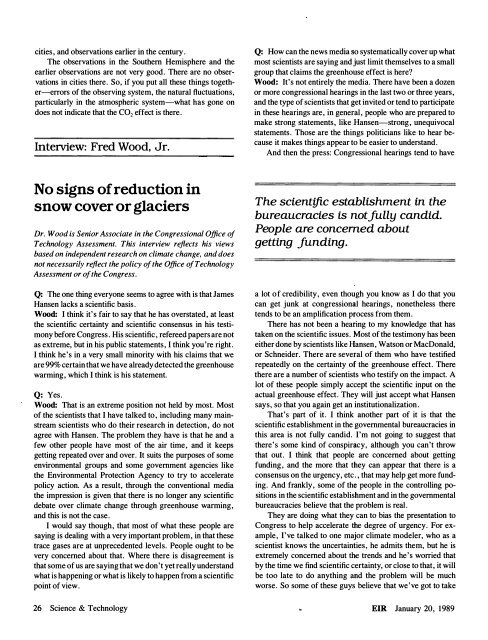View Full Issue - Executive Intelligence Review
View Full Issue - Executive Intelligence Review
View Full Issue - Executive Intelligence Review
Create successful ePaper yourself
Turn your PDF publications into a flip-book with our unique Google optimized e-Paper software.
cities, and observations earlier in the century .<br />
The observations in the Southern Hemisphere and the<br />
earlier observations are not very good. There are no observations<br />
in cities there. So, if you put all these things together-errors<br />
of the observing system, the natural fluctuations,<br />
particularly in the atmospheric system-what has gone on<br />
does not indicate that the CO2 effect is there.<br />
InteI<strong>View</strong>: Fred Wood, Jr.<br />
No signs of reduction in<br />
snow cover or glaciers<br />
Dr. Wood is Senior Associate in the Congressional Office of<br />
Technology Assessment. This interview reflects his views<br />
based on independent research on climate change, and does<br />
not necessarily reflect the policy of the Office of Technology<br />
Assessment or of the Congress.<br />
Q: The one thing everyone seems to agree with is that James<br />
Hansen lacks a scientific basis.<br />
Wood: I think it's fair to say that he has overstated, at least<br />
the scientific certainty and scientific consensus in his testimony<br />
before Congress. His scientific, refereed papers are not<br />
as extreme, but in his public statements, I think you're right.<br />
I think he's in a very small minority with his claims that we<br />
are 99% certain that we have already detected the greenhouse<br />
warming, which I think is his statement.<br />
Q: Yes.<br />
Wood: That is an extreme position not held by most. Most<br />
of the scientists that I have talked to , including many mainstream<br />
scientists who do their research in detection, do not<br />
agree with Hansen. The problem they have is that he and a<br />
few other people have most of the air time, and it keeps<br />
getting repeated over and over. It suits the purposes of some<br />
environmental groups and some government agencies like<br />
the Environmental Protection Agency to try to accelerate<br />
policy action. As a result, through the conventional media<br />
the impression is given that there is no longer any scientific<br />
debate over climate change through greenhouse warming,<br />
and this is not the case.<br />
I would say though, that most of what these people are<br />
saying is dealing with a very important problem, in that these<br />
trace gases are at unprecedented levels. People ought to be<br />
very concerned about that. Where there is disagreement is<br />
that some of us are saying that we don't yet really understand<br />
what is happening or what is likely to happen from a scientific<br />
point of view.<br />
26 Science & Technology<br />
Q: How can the news media so systematically cover up what<br />
most scientists are saying and just limit themselves to a small<br />
group that claims the greenhouse effect is here?<br />
Wood: It's not entirely the media. There have been a dozen<br />
or more congressional hearings in the last two or three years,<br />
and the type of scientists that get invited or tend to participate<br />
in these hearings are, in general, people who are prepared to<br />
make strong statements, like Hansen-strong, unequivocal<br />
statements. Those are the things politicians like to hear because<br />
it makes things appear to be easier to understand.<br />
And then the press: Congressional hearings tend to have<br />
The scientific establishment in the<br />
bureaucracies is notfully candid.<br />
People are concerned about<br />
getting funding.<br />
a lot of credibility, even though you know as I do that you<br />
can get junk at congressional hearings, nonetheless there<br />
tends to be an amplification process from them.<br />
There has not been a hearing to my knowledge that has<br />
taken on the scientific issues. Most of the testimony has been<br />
either done by scientists like Hansen, Watson or MacDonald,<br />
or Schneider. There are several of them who have testified<br />
repeatedly on the certainty of the greenhouse effect. There<br />
there are a number of scientists who testify on the impact. A<br />
lot of these people simply accept the scientific input on the<br />
actual greenhouse effect. They will just accept what Hansen<br />
says, so that you again get an institutionalization.<br />
That's part of it. I think another part of it is that the<br />
scientific establishment in the governmental bureaucracies in<br />
this area is not fully candid. I'm not going to suggest that<br />
there's some kind of conspiracy, although you can't throw<br />
that out. I think that people are concerned about getting<br />
funding, and the more that they can appear that there is a<br />
consensus on the urgency, etc. , that may help get more funding.<br />
And frankly, some of the people in the controlling positions<br />
in the scientific establishment and in the governmental<br />
bureaucracies believe that the problem is real.<br />
They are doing what they can to bias the presentation to<br />
Congress to help accelerate the degree of urgency. For example,<br />
I've talked to one major climate modeler, who as a<br />
scientist knows the uncertainties, he admits them, but he is<br />
extremely concerned about the trends and he's worried that<br />
by the time we find scientific certainty, or close to that, it will<br />
be . too late to do anything and the problem will be much<br />
worse. So some of these guys believe that we've got to take<br />
EIR January 20, 1989

















